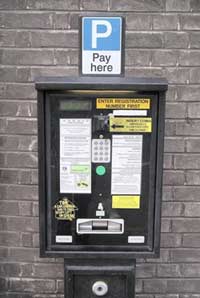The Cost of Parking at Work

According to a newspaper report, another so-called “green” levy pulled from the hat by a dozen or so UK city councils is likely to have working motorists turning purple with rage. In a nutshell, it seems many local planners believe now is the time to introduce workplace parking charges which could amount to as much as £1,000 per year for each parking space.
Council officials reason that parking levies are a means to cut pollution and reduce traffic congestion while simultaneously raising cash to spend on sustainable public transport projects.
However, some motor trade industry experts have branded such schemes a “tax on going to work”, given that the costs will almost inevitably be passed on to everyone who drives to work.
The AA labelled the proposals another raid on workers’ pay packets which amounted to little more than a ‘poll tax on wheels’.
Nottingham, the first city out of the blocks, have done precisely this. Here, staff have been saddled with more than 50% of the excess costs – as local teachers, care workers and others who serve the community can now testify.
Elsewhere, the report reveals councils in Bath, Birmingham, Brighton, Bristol, Cambridge, Colchester, Leicester, Luton, Norwich, Oxford, Warrington, and some London boroughs also have workplace car parking firmly in their sights.
Motorists who drive to work must wonder if this squeeze will ever end: As any insurance broker will confirm, most insurers will need to know if you take your car to work – and where it is parked – before they will issue a private or motor trade insurance policy, now it looks as if city councils are trying to get in on the act too.
Questions are already being asked about the transparency of such moves, for instance, if amenities such as office car-parking spaces already attract higher company business rates, is this not just charging twice over for the same feature?
Plus, if workers are forced to pay annually for a space at work, won’t that dilute any incentive to take the ‘greener’ option of working from home?

Furthermore, if this really is yet another ‘green’ tax, why do the proposed measures say absolutely nothing about an exemption for those motorists who have shelled out on an electric car?
No doubt the last point will have implications for some of those working in the motor trade, can new and used vehicle dealership salespeople expect a barrage of questions about how buying an electric car will genuinely affect their wallet and lifestyle.
All this comes during a severe cost of living crisis, with drivers already facing soaring petrol prices. Both the AA and RAC were united in their condemnation of parking levies for those commuting to the city by car, pointing out such measures would always penalise low-income workers the most.
Restating the AA’s view that practical park-and-ride schemes were a more ‘viable and proven’ alternative, spokesperson, Luke Bosdet continued: ‘Councils try to justify this tax as a way of raising money for their pet transport projects’, adding that the levy represented ‘… just a poll tax on wheels that not only raids workers’ pay packets, while trying to place the blame on employers, but hits the lower-paid hardest.’
Meanwhile, the RAC’s Roads policy chief, Nicholas Lyes, noted: ‘This [tax] especially affects lower-paid workers who may not have any other way of getting to work.’







